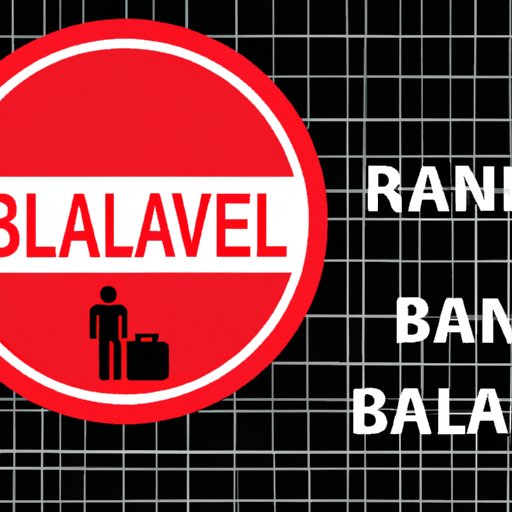Introduction
Travel bans are a type of restriction imposed by governments on citizens traveling to certain countries or regions. These restrictions can be in the form of complete bans, partial bans, or visa requirements. They are often used as a tool for governments to protect their citizens from dangerous situations abroad or to enforce foreign policy objectives. This article will explore the pros and cons of travel bans, including their historical context, ethical implications, economic impact, political motivations, and effectiveness in achieving desired outcomes.
Historical Analysis of Travel Bans
Throughout history, governments have used travel restrictions to limit the movement of people into and out of their countries. For example, during World War II, several nations imposed travel bans on their citizens to prevent them from joining the enemy forces. During the Cold War, many countries restricted the movement of people within their own borders and between other countries, in an effort to control the spread of communism. More recently, travel bans have been used to protect citizens from terrorist attacks or civil unrest in certain countries.
In examining the impact of travel restrictions on society throughout history, it is important to understand the precedent set by past travel bans. For example, the United States has a long history of using travel bans to restrict citizens from entering certain countries. In the 1950s, the US banned travel to Cuba, and in the 1980s, the US imposed a ban on travel to Iran. In more recent years, the US has imposed travel bans on citizens from a number of countries, including Syria, Iraq, Yemen, and Libya.
Exploring the Ethical Implications of Travel Bans
When evaluating the morality of travel bans, there are a number of moral and practical considerations that must be taken into account. On a moral level, travel bans can be seen as a violation of basic human rights, such as the right to freedom of movement. Practically speaking, travel bans can also impede the progress of business, trade, and tourism.
In assessing the fairness of travel bans, it is important to consider the reasons for imposing them. Are they being used as a tool for protection, or to achieve political objectives? Are the restrictions justified, or are they simply a way to discriminate against certain groups of people? These are important questions to ask when considering the ethics of travel bans.

Examining the Economic Impact of Travel Bans
Travel bans can have a significant impact on the economy, both domestically and internationally. When people are prevented from traveling, businesses suffer. Tourism is one of the most heavily impacted industries, as travel bans make it difficult for tourists to visit certain destinations. This can lead to a decrease in the amount of money spent in those locations, which can have a negative effect on the local economy.
In addition to the direct impact on businesses, travel bans can also have an indirect effect on the economy. For example, if travel bans make it difficult for businesses to hire workers from abroad, this could lead to lower wages and higher prices for goods and services. This could then have a ripple effect across the entire economy, as consumers may be less likely to spend money if prices are too high.

Analyzing the Political Motivations Behind Travel Bans
It is important to consider the political motivations behind travel bans when evaluating their efficacy. Governments may impose travel bans for a number of reasons, including to protect their citizens from terrorist attacks or civil unrest in certain countries, to enforce foreign policy objectives, or to limit the movement of people with certain political beliefs.
In addition to protecting citizens, travel bans can also be used to exert pressure on foreign governments. For example, the US has recently imposed travel bans on citizens from several countries in an effort to force those governments to change their policies. This type of travel ban can have a significant impact on international relationships, as it can be seen as a sign of aggression or hostility.

Evaluating the Effectiveness of Travel Bans in Achieving Desired Outcomes
Once the reasons for imposing a travel ban have been established, it is important to assess its effectiveness in achieving the desired outcome. According to a study conducted by the European Commission, travel bans are not always effective in achieving their intended goals. In some cases, they can even have unintended consequences, such as creating political tensions between countries or encouraging illegal immigration.
In addition, it is important to consider the long-term effects of travel bans. Although they may be effective in the short term, their effectiveness in the long term is questionable. For example, if a travel ban is used to limit the movement of people with certain political beliefs, this could lead to increased resentment and hostility towards the government, which could lead to further unrest and violence.
Conclusion
This article has explored the pros and cons of travel bans, including their historical context, ethical implications, economic impact, political motivations, and effectiveness in achieving desired outcomes. It has become clear that travel bans can have far-reaching implications, both positive and negative. Therefore, it is important to consider the impact of travel bans on society before implementing them.
In order to address the problems caused by travel bans, it is important to find solutions that are fair and equitable for all affected parties. This could include providing assistance to those affected by travel bans, or offering alternative forms of travel that do not require a visa. Additionally, governments should strive to ensure that travel restrictions are only used as a last resort, and that they are implemented in a way that maximizes their effectiveness in achieving the desired outcome.
Finally, it is important for those affected by travel bans to remember that there are resources available to help them navigate the complex regulations and restrictions. Organizations such as the International Air Transport Association (IATA) can provide valuable advice and assistance to those experiencing difficulties with travel bans.
(Note: Is this article not meeting your expectations? Do you have knowledge or insights to share? Unlock new opportunities and expand your reach by joining our authors team. Click Registration to join us and share your expertise with our readers.)
